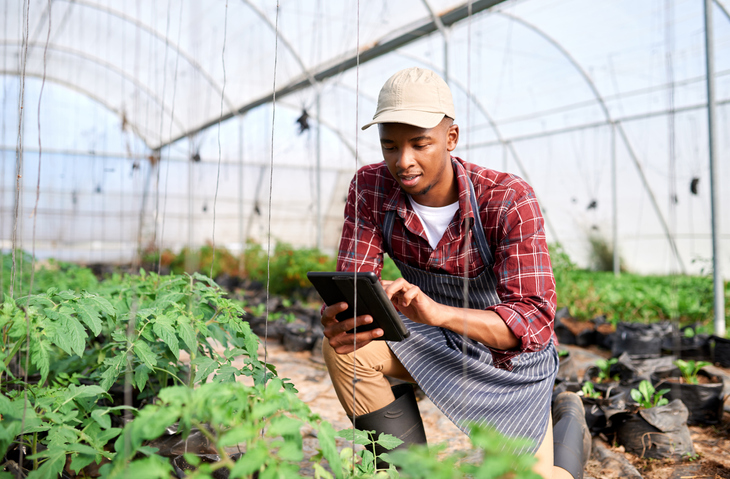How Some Black Gulf Coast Farmers Are Leading the Way In Climate-Smart Agriculture

Black Gulf Coast farmers like Iowa, Louisiana’s Hilery Gobert are growing crops using farming techniques that keep climate change and their local ecosystems in mind. Gobert and others are practicing climate-smart agriculture, which some scientists say is beneficial for both the farmers and the communities they call home.
According to NPR, Gobert’s techniques involve rotating his crops and using cover crops, or plants that are grown to preserve the soil’s nutrients, which has resulted in a wide variety of produce on his land. Gobert’s farm produces okra, figs, watermelon, and even rice.
Gobert described to NPR his efforts to grow rice in a way that differs from the traditional method of flooding fields. As BLACK ENTERPRISE previously reported, some areas of Louisiana have faced difficulties with drought, and using less water to grow rice is a positive development.
“In our attempt to reduce greenhouse gas emissions, we’re looking at ways of growing rice as an alternative to the continuous flooding of the fields, as we’ve done for hundreds of years here in Louisiana,” Gobert told NPR.
According to the U.S. Department of Agriculture, Gobert’s method of growing rice, which involves using drip irrigation to more directly infuse rice plants with water at the roots, is an example of climate-smart agriculture.
Although there is no consensus on the impact of climate-smart agriculture on the climate, Paul West, a senior scientist at Project Drawdown who researches ecosystems and agriculture, told NPR that those practices are still good habits to implement.
“I think a lot of climate-smart farming practices are very good in terms of the health of the soil and long-term productivity for a farmer,” West told the outlet.
According to Gobert, the seeds for his methods were planted in him by his father, who warned him that the land needed to be taken care of, and it will in turn take care of the farmers who work it.
“One of his statements to me that I’ll never forget as a child is that all of these inputs that we’re bringing into our farm is great, and we’re able to make money off of it, but one day we’re going to pay for not taking care of the land,” Gobert said.
On Sept. 12, the White House conducted a roundtable to discuss ways that it can support its initial $3 billion investment in 2023 into the practice of climate-smart agriculture to leverage technology to reduce emissions, store carbon, and open up new revenue streams.
According to the readout, “Participants discussed opportunities to reduce barriers to adoption of climate smart agricultural practices, as these tools must work for operations of all sizes and ensure equity in delivery. Administration officials and participants agreed that to address the climate crisis and build stronger rural economies, solutions should continue to be locally led, science-based, and encourage innovation.”
The readout continued, “The discussion also highlighted the role of efforts to improve outreach and education as well as financial and environmental measurement, verification, and reporting. Administration officials sought feedback on implementation of investments, efforts to scale up climate-smart agriculture, and opportunities for stacking and aligning incentives.”
Part of these aligning incentives involves the federal government working with Black land-grant institutions, or HBCUs, which has a history stretching back to the days of George Washington Carver and the lesser-known but equally influential Booker Whatley. Through the Agriculture Department’s program Partnerships for Climate-Smart Commodities, small-scale and other underserved farmers work with HBCUs to create projects that will help farmers, ranchers, and private forest landowners tackle climate change.
With the resolution of Pigford v. Glickman, farming co-ops, which functioned as mediators between Black farmers and the federal government, whom those farmers were distrustful of because of discrimination, morphed into advocates for Black farmers, often working to ensure that money earmarked for climate-smart agriculture gets to often-underserved Black farmers.
Chris Muse, a Black Louisiana farmer who co-founded Muse 3 Farm with his brothers in 2015, is dedicated to helping Black farmers cultivate their land and access available funding. He actively encourages fellow farmers to seek out financial resources and emphasized to NPR the importance of maintaining healthy soil for sustainable farming.
“One of the things we’ve been working with the other local farmers to do is soil health,” Muse told NPR. “How do you improve upon your soil health without having a lot of additives like synthetic fertilizers, herbicides, pesticides.”
Muse continued, “What I tell my small Black farmers is that the funding is there now,” Muse says. “What are you going to do? You going to get your share of the funding, or are you going to let the next farmer get your share?”
RELATED CONTENT: It’s About Time! After Years Of Discrimination, Black Farmers To Receive $2B From U.S. Government
Welcome to Billionaire Club Co LLC, your gateway to a brand-new social media experience! Sign up today and dive into over 10,000 fresh daily articles and videos curated just for your enjoyment. Enjoy the ad free experience, unlimited content interactions, and get that coveted blue check verification—all for just $1 a month!
Account Frozen
Your account is frozen. You can still view content but cannot interact with it.
Please go to your settings to update your account status.
Open Profile Settings